Hogwarts Houses and the Four Elements
for were there such friends anywhere
as Slytherin and Gryffindor?
Unless it was the second pair
of Hufflepuff and Ravenclaw?
Calcinatio - Fire - Cleaning
Latin: calx = Lime.
To intensely heat (as with inorganic materials) to a high temperature, but without fusion, in order to drive off volatile matter, or to effect changes (as oxidation or pulverization.) What remains is a fine dry powder.
Fire transforms solid matter into ash. Inner heat transforms food into energy and thoughts into emotions. Get fired up and get going. Mindless passion and a hot temper in the heat of the moment.
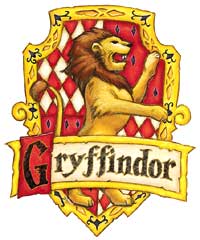 |
You might belong in Gryffindor,
Where dwell the brave at heart,
Their daring, nerve, and chivalry
Set Gryffindors apart;
By Gryffindor, the bravest were
Prized far beyond the rest;
Said Gryffindor, "We'll teach all those
with brave deeds to their name."
|
 |
The Lion is a solar symbol often shown opposite the Unicorn. It symbolizes courage, bravery and nobility.
Like Ravenclaw, house rooms are in a tower. In the case of Gryffindor, the entrance to the common room is located behind a large painting of a Fat Lady in a pink silk dress on the seventh floor.
Harry Potter Lexicon on Gryffindor House
Nasubionna on Gryffindor Characters
Solutio - Water - Opening
Latin: solutio; solvere = to loosen, to solve.
In the solutio process, the solid seems to disappear into the solution as if it had been swallowed up.
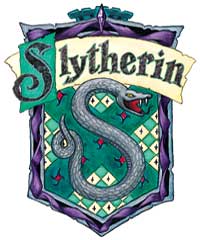 |
Or perhaps in Slytherin
You'll make your real friends,
Those cunning folks use any means
To achieve their ends.
And power-hungry Slytherin
Loved those of great ambition.
Said Slytherin, "We'll teach just those
whose ancestry is purest."
|
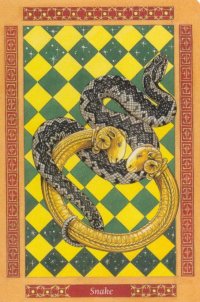 |
Clearly, the people we've met in Slytherin so far represent the most negative aspects of water - such as thirst/compulsiveness. But I believe that there is much that we have yet to see about the positive side of this house. The serpent is the perfect example. From a fundamentalist Christian perspective, the serpent is known as the tempter of Eve; Satan in disguise. Yet serpents are associated with healing gods and goddesses (e.g. Asclepios, Brigid) as well as wells.
In the Bible, Jesus sends off his disciples with the admonition "Behold, I send you forth as sheep in the midst of wolves: be ye therefore wise as serpents and harmless as doves" (Matthew 10:16, KJV). The serpent's tendency to appear harmless, dead, or peaceable and then suddenly attack is the basis of several Biblical allegories. Solomon, when speaking of wine, warns that at first it seems desirable but "At the last it bites like a serpent, and stings like a viper" (Prov 23:32)
"The word "insinuate", coming from the same root as "sinuous" and "sine", also implies deviation from the straight and narrow, like the word "devious". We refer to some people as "creeping" or "crawling", more pejorative words. "Low cunning" has the same kind of connotation. Another negative word is "backsliding"." Yet, given Rowling's proven erudition, I wouldn't discount idea that the word "cunning" may be a double entendre, rather than simply a negative slight.
Cunning Folk - "Cunning-folk, who were also known as wise-women, wise-men, conjurors and wizards, were an integral part of English society right up until the early twentieth century. Over the centuries hundreds of thousands of people must have consulted them regarding a wide range of problems, but particularly those concerning affairs of the heart, theft, sickness and most important of all witchcraft. They were multi-skilled, or at least professed to be so. They practised herbalism, treasure-seeking and love magic. They revealed the identity of thieves and divined the whereabouts of lost and stolen property. The more learned cunning-folk also practised astrology, while the less learned pretended to be masters of the art. The most lucrative aspect of their business was the curing of those people and animals who were thought to be bewitched, and also the trade in charms to ward off witches and evil spirits."
"Wells and springs were reputed in folklore to be the entrances to the Other Worlds and, like thresholds the world over, many of them had guardians. ...serpents were said to have guarded Ffynnon Sarff near Caerrnarvon and Grinston Well in Pembrokeshire (a winged serpent in this case). Giraldus Cambrensis tells of a certain well in Pembrokeshire (without unfortunately identifying it) that there lived within its depths a viper which guarded a golden torc - and bit the hand of any would-be treasure hunters."
Monstrous guardians of the waters - It's not all benign though. "The last were dragons or serpents, conventional forms of the reptiles which once dwelt in watery places, attacking all who came near. This old idea certainly survived in Irish and Highland belief, for the Fians conquered huge dragons or serpents in lochs, or saints chained them to the bottom of the waters. Hence the common place-name of Loch na piast, "Loch of the Monster." In other tales they emerge and devour the impious or feast on the dead. The Dracs of French superstition--river monsters who assume human form and drag down victims to the depths, where they devour them--resemble these."
["Death Eaters" anyone?]
Possibly like Hufflepuff, the house rooms are below ground. The Slytherin common room is a low-ceilinged, dungeon-like room with greenish lamps and chairs. It is located under the lake.
Harry Potter Lexicon on Slytherin House
Nasubionna on Slytherin Characters
Coagulatio - Earth - Nourishing
Latin: coagulum =to curdle; from cogere = to drive together.
The process which turns something into earth. For example, cooling which turns a liquid into a solid.
Fixation - ego lays down roots
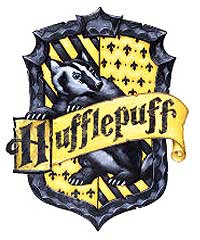 |
You might belong in Hufflepuff,
Where they are just and loyal,
Those patient Hufflepuffs are true
And unafraid of toil;
For Hufflepuff, hard workers were
Most worthy of admission;
Said Hufflepuff, "I'll teach the lot,
and treat them just the same."
|
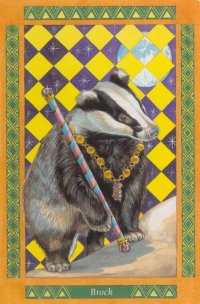 |
The Brock, or Badger is steady, tenacious, and home-loving. Badger is sociable, living with his family in large underground catacombs called "setts". A superb digger, it is able to see beneath the surface of people and things. It has great courage and power when angered or driven to extreme measures. It is unyielding in the face of danger. A member of the weasel family, the badger’s size, strength, and aggressive retaliatory behavior make it a formidable opponent for most potential predators, but they are not aggressive unless trapped or injured.
I think of poor overlooked Hufflepuff as the HP equivalent of the Hobbits in LOTR.
Presumably, like Slytherin, the house rooms are underground. The exact location is yet unknown, but down a staircase off the main hall. Cellar-like in appearance.
Harry Potter Lexicon on Hufflepuff House
Nasubionna on Hufflepuff Characters
Sublimatio - Air - Clear Seeing
Latin: sublimis = to elevate over a threshold.
To cause to pass off from the solid to the vapor state by heating, and again to condense into solid form.
Infuse ego with spirit; transform words to deeds
 |
Or yet in wise old Ravenclaw,
If you've a ready mind,
Where those of wit and learning,
Will always find their kind;
For Ravenclaw, the cleverest
Would always be the best;
Said Ravenclaw, "We'll teach those whose
intelligence is surest."
|
 |
The eagle is a solar symbol, as is the lion. In fact the pair often appear in alchemical emblems. According to legend, it can stare at the sun without blinking. The eagle is associated with ascension, inspiration, freedom, and temporal and spiritual power (it is one the symbols of Jupiter).
Like Gryffindor, house rooms are in a tower. Ravenclaw Tower is located on the west side of the castle.
Harry Potter Lexicon on Ravenclaw House
Nasubionna on Ravenclaw Characters
Images besides the Hogwarts crests are from the 1994 oracle deck Beasts of Albion by Miranda Gray. Published by Aquarian (HarperCollinsPublishers)
The Four Elements: More Correspondences
And this is the root and foundation of all bodies, natures, virtues, and wonderful works; and he which shall know these qualities of the elements, and their mixtions, shall easily bring to pass such things as are wonderful, and astonishing, and shall be perfect in magic.
- Henry Cornelius Agrippa
| |
Fire O |
Water N |
Air M |
Earth L |
|---|
| Tarot Suit |
wands, batons, rods, sceptres |
cups |
swords |
pentacles, coins, disks |
|---|
| Quality |
heat and dryness |
cold and moisture |
heat and moisture |
cold and dryness |
|---|
| Humor |
Choler |
Phlegm |
Blood |
Melancholy |
|---|
| Elementals |
Salamanders |
Undines |
Sylphs |
Gnomes |
|---|
| Psychological |
Feeling, Will, Idea, Ardent |
Intuition, Pattern, Sensitive |
Intellect, Plan, Excitable |
Sensation, Function, Cautious |
|---|
| Powers of the Sphinx |
Velle, To Will |
Audere, To Dare |
Scire, To Know |
Tacere, To Keep Silence |
|---|
See also:
The Ancient Greek Esoteric Doctrine of the Elements by John Opsopaus
E-Mail
Home
Copyright © 2005 Joan Schraith Cole. All Rights Reserved
Updated March 22, 2005







